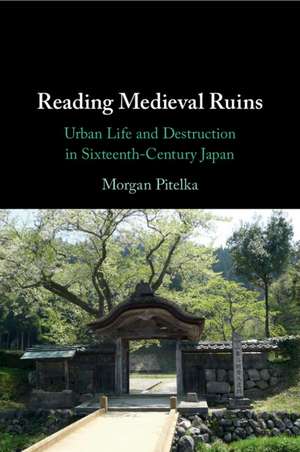Reading Medieval Ruins: Urban Life and Destruction in Sixteenth-Century Japan
Autor Morgan Pitelkaen Limba Engleză Paperback – 25 oct 2023
| Toate formatele și edițiile | Preț | Express |
|---|---|---|
| Paperback (1) | 176.91 lei 3-5 săpt. | +13.27 lei 7-13 zile |
| Cambridge University Press – 25 oct 2023 | 176.91 lei 3-5 săpt. | +13.27 lei 7-13 zile |
| Hardback (1) | 582.20 lei 6-8 săpt. | |
| Cambridge University Press – 6 apr 2022 | 582.20 lei 6-8 săpt. |
Preț: 176.91 lei
Nou
Puncte Express: 265
Preț estimativ în valută:
33.85€ • 35.27$ • 28.03£
33.85€ • 35.27$ • 28.03£
Carte disponibilă
Livrare economică 13-27 martie
Livrare express 27 februarie-05 martie pentru 23.26 lei
Preluare comenzi: 021 569.72.76
Specificații
ISBN-13: 9781009069977
ISBN-10: 1009069977
Pagini: 255
Dimensiuni: 229 x 152 x 18 mm
Greutate: 0.35 kg
Editura: Cambridge University Press
Colecția Cambridge University Press
Locul publicării:New York, United States
ISBN-10: 1009069977
Pagini: 255
Dimensiuni: 229 x 152 x 18 mm
Greutate: 0.35 kg
Editura: Cambridge University Press
Colecția Cambridge University Press
Locul publicării:New York, United States
Cuprins
Acknowledgements; Prologue; 1. A provincial palace city as an urban space; 2. The material culture of urban life; 3. Late medieval warlords and the agglomeration of power; 4. The material foundations of faith; 5. Culture and sociability in the provinces; 6. Urban destruction in late medieval japan; Epilogue: The excavated nation on display; Bibliography; Index.
Recenzii
'Detailing the establishment, occupation, brutal destruction, and subsequent recreation of a nationally important heritage site, Morgan Pitelka invites us to join the 'dance of agency' at Ichijodani, seat of the powerful Asakura clan. Through detailed and painstaking reconstruction of the quotidian experiences of this provincial city, Pitelka eloquently demonstrates how investigations here both defined medieval archaeology in Japan, and demand a fundamental re-evaluation of the dominant historical narratives around the unification of Japan in the late sixteenth century.' Simon Kaner, Sainsbury Institute for the Study of Japanese Arts and Cultures and the University of East Anglia
'Reading Medieval Ruins invites us into the heart of a destroyed sixteenth-century city and resurrects the people who made their lives and livelihoods in the shadow of a fortified castle. It is both a beautifully rendered argument for the vitality of provincial urban spaces and a moving meditation on what was lost when these thriving communities were destroyed by war. By illuminating the ordinary lives and mundane objects that are too often obscured by tales of samurai generals and their conquests, this book makes a groundbreaking contribution to the history of Japan's medieval era.' Amy Stanley, Northwestern University
'A wonderful and intellectual read, this book is an engaging look at medieval Japan through the eyes of both a modern historian and a common citizen living in the city of Ichijōdani before its destruction. This book balances enjoyability and history education without, at any point, being dry or dull. One can confidently recommend this book to both refined scholars and history enthusiasts.' Fin Davey, World History Encyclopedia
'Reading Medieval Ruins invites us into the heart of a destroyed sixteenth-century city and resurrects the people who made their lives and livelihoods in the shadow of a fortified castle. It is both a beautifully rendered argument for the vitality of provincial urban spaces and a moving meditation on what was lost when these thriving communities were destroyed by war. By illuminating the ordinary lives and mundane objects that are too often obscured by tales of samurai generals and their conquests, this book makes a groundbreaking contribution to the history of Japan's medieval era.' Amy Stanley, Northwestern University
'A wonderful and intellectual read, this book is an engaging look at medieval Japan through the eyes of both a modern historian and a common citizen living in the city of Ichijōdani before its destruction. This book balances enjoyability and history education without, at any point, being dry or dull. One can confidently recommend this book to both refined scholars and history enthusiasts.' Fin Davey, World History Encyclopedia
Notă biografică
Descriere
An innovative new study of daily life and urban society in late medieval Japan.
